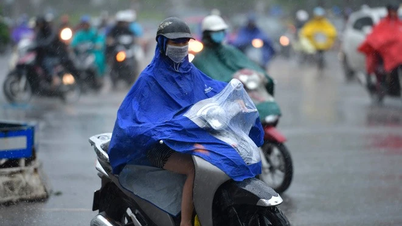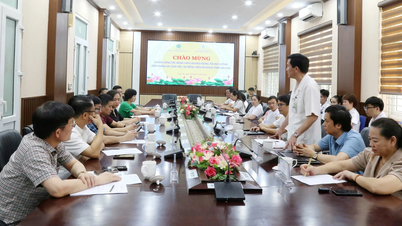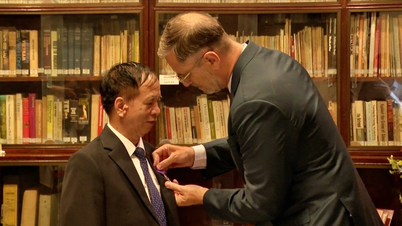The health sector has promoted propaganda activities to prevent mother-to-child HIV transmission to raise awareness and promote the participation of the whole society, towards the goal of eliminating mother-to-child HIV transmission by 2030.
At the June advocacy conference in localities, officials from many commune, ward and town health stations promoted and raised people's awareness of the prevention of mother-to-child HIV transmission, the benefits of early HIV testing and early treatment to prevent mother-to-child HIV transmission; called for reducing stigma and discrimination against pregnant women with HIV and children born to HIV-infected mothers. The coordination of health workers in advocacy conferences, village meetings or at market fairs helped the propaganda content reach many people.

Since 2016, the work of preventing mother-to-child HIV transmission has been implemented in Lao Cai province. Up to now, this work has been widely implemented in 9 districts, towns and cities with full services such as voluntary HIV counseling and testing for pregnant women; HIV prevention treatment for pregnant women with HIV and their children with anti-HIV drugs; coordination of pregnancy care and management; counseling and support for appropriate feeding methods for children born to HIV-infected mothers, etc.
At the Department of Reproductive Support, the Provincial Obstetrics and Pediatrics Hospital, pregnant women who come for examination and treatment are advised by doctors to test for HIV. Doctor Nguyen Duc Huan, Deputy Head of the Department of Reproductive Support, said: Pregnant women need to proactively test for HIV for early detection to have a preventive treatment plan. For mothers who are infected with HIV, they must start ARV treatment early, take ARV drugs for at least 24 months, adhere to treatment well and should consult a specialist about the time of pregnancy. During pregnancy, HIV-infected mothers need to have regular prenatal check-ups to receive advice and guidance on maternity care, choose a suitable place to give birth; adhere to treatment to keep the viral load below 200 copies/ml of blood to minimize the possibility of transmitting HIV to the child. After giving birth, HIV-infected mothers need to go to an HIV/AIDS treatment facility to continue monitoring their health and receiving ARV treatment. Babies will be given ARVs within 24 hours of birth as directed by a doctor to prevent mother-to-child transmission of HIV. HIV can be transmitted from mother to child because HIV is present in breast milk or blood, secretions from cracks in the mother's nipples, so it is best not to breastfeed.

According to information from the provincial Center for Disease Control, in the past 10 years, every year, in the province, about 14,000 to 17,000 pregnant women have been tested for HIV (through testing, 77 cases of pregnant women with HIV were detected, of which 74 cases had been treated to prevent HIV transmission from mother to child, 3 cases came late so the HIV test results were available after giving birth); 117 cases of HIV-infected women who were on ARV treatment became pregnant. Notably, in the past 10 years, 194 children born to HIV-infected mothers who were treated for prevention and given anti-HIV drugs for prevention were not infected with HIV.

However, in addition to the achieved results, the work of preventing HIV transmission from mother to child in the province also faces many difficulties. Doctor Dinh Thi Hoan, Department of HIV/AIDS Prevention, Provincial Center for Disease Control said: Lao Cai is a mountainous province, with many remote and mountainous villages and hamlets, inconvenient transportation, and most people infected with HIV have difficult economic circumstances, so connecting and transferring pregnant women and their children to HIV/AIDS treatment facilities is difficult. In addition, barriers due to stigma and discrimination, due to self-stigma, make pregnant women not want to test for HIV early or have discovered that they are infected with HIV but do not receive care and treatment services or receive them but are afraid of being known by others, so they do not comply well.

Before 2020, HIV testing for pregnant women was funded from the national target program budget and provincial budget. From 2021, there will be no more support funding and it will be paid by health insurance according to the Law on Prevention and Control of Human Immunodeficiency Virus (HIV/AIDS). However, according to the Law on Medical Examination and Treatment, health insurance only covers HIV testing for cases related to diagnosis and treatment according to the hierarchy, not HIV screening for all pregnant women. Therefore, currently, pregnant women will have to pay for HIV testing themselves when voluntarily testing.
The health sector is increasing the provision of services to detect, manage and treat people living with HIV as well as prevent mother-to-child transmission of HIV. In particular, the grassroots health sector always makes efforts in propaganda, contributing to raising community awareness.

Source


![[Photo] Prime Minister Pham Minh Chinh receives Ambassador of the French Republic to Vietnam Olivier Brochet](https://vphoto.vietnam.vn/thumb/1200x675/vietnam/resource/IMAGE/2025/5/13/f5441496fa4a456abf47c8c747d2fe92)
![[Photo] President Luong Cuong awarded the title "Heroic City" to Hai Phong city](https://vphoto.vietnam.vn/thumb/1200x675/vietnam/resource/IMAGE/2025/5/13/d1921aa358994c0f97435a490b3d5065)


![[Photo] President Luong Cuong attends the inauguration of the international container port in Hai Phong](https://vphoto.vietnam.vn/thumb/1200x675/vietnam/resource/IMAGE/2025/5/13/9544c01a03e241fdadb6f9708e1c0b65)
![[Photo] Many people in Hanoi welcome Buddha's relics to Quan Su Pagoda](https://vphoto.vietnam.vn/thumb/1200x675/vietnam/resource/IMAGE/2025/5/13/3e93a7303e1d4d98b6a65e64be57e870)

























































































Comment (0)